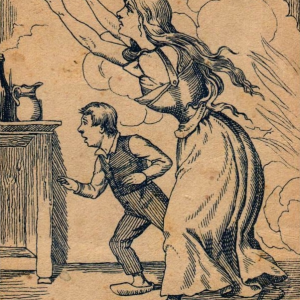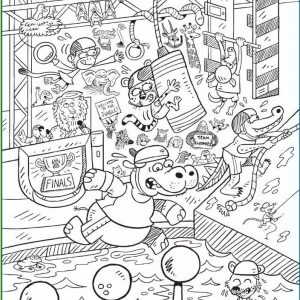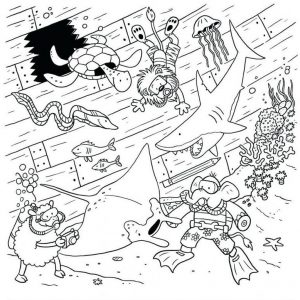Swing into Fun: Mastering the “Find 3 Differences” Puzzle with an Elderly Woman on a Swing
Discover the Charm of Spot-the-Difference Puzzles
Have you ever paused mid-scroll to inspect two almost identical images, determined to uncover every hidden tweak? Spot-the-difference puzzles like our “Find 3 Differences” challenge—featuring a joyful elderly woman swinging against a cloud-dappled sky—tap into that irresistible urge. They blend simple entertainment with a mental workout, offering quick bursts of satisfaction as you spot each subtle alteration. Ready to sharpen your eyes and flex your brain? Let’s dive into this delightful swing-themed puzzle and explore why these challenges captivate enthusiasts worldwide.
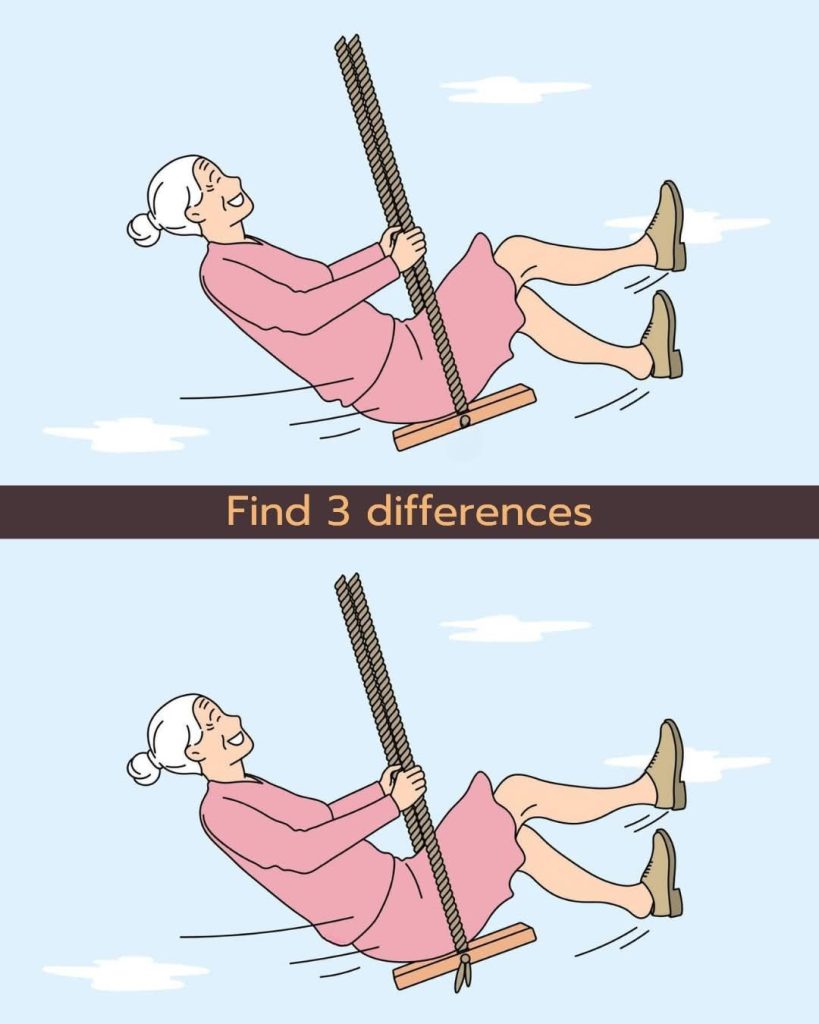
Why “Find the Difference” Puzzles Engage Your Mind
Spot-the-difference games pack a surprising cognitive punch. Here’s why they’re more than just a pastime:
- Enhancing Visual Acuity
Scanning for tiny changes—like a missing cloud, a shifted rope tassel, or a shoe detail—trains your eye to detect subtle contrasts. Over time, you’ll notice more in everyday scenes, from product labels to photographic details. - Boosting Concentration
These puzzles demand focused attention. By forcing you to ignore distractions and zero in on minute variations, they help lengthen your attention span and build mental stamina. - Strengthening Memory
Keeping track of which areas you’ve already inspected exercises your short-term memory. Juggling multiple sections of the image in your mind trains your brain to hold and manipulate visual information more effectively. - Promoting Mindfulness
Immersing yourself in a relaxing, screen-based challenge creates a brief mental escape from stress. The simple pleasure of spotting a difference delivers a mini “aha!” moment that releases feel-good neurotransmitters.

Unpacking the Swing Puzzle: A Step-by-Step Guide
Let’s take a closer look at our swing puzzle scene: an elderly woman in a rose-pink dress swinging skyward, her silver hair in a neat bun, framed by wispy clouds. Spotting the three differences requires a strategic approach:
- Initial Scan
Give your eyes a quick sweep of the entire scene. Take in major elements—the swing ropes, the seat, the clouds, and her flowing dress. This broad overview sets the stage for deeper inspection. - Divide and Conquer
Mentally split the image into left and right halves or upper and lower zones. Tackle one section at a time to ensure you don’t overlook a subtle change near the edge. - Look for Missing Elements
Compare the presence or absence of objects. In this puzzle, you might notice that one cloud in the top scene vanishes in the bottom, or that the tassel at the end of the swing rope appears only in one version. - Check Small Details
Focus on the woman’s attire and accessories. Is her shoe pattern identical? Are the folds of her skirt identical? Small wardrobe tweaks often hide the puzzle’s secrets. - Spot Rope and Motion Lines
The swinging motion is indicated by curved lines. Are they in the same position and shape? Has one rope segment shifted its angle? Differences in motion lines or rope length are classic trick spots.

Three Hidden Differences Revealed
If you’ve been hunting hard, here are the three key changes to look for:
- Cloud Count Change
In the top image, two clouds drift near her head; in the bottom, the upper-right cloud disappears, leaving a cleaner sky. - Rope Tassel Tweak
The swing’s rope tassel dangles beneath the seat in one picture but is missing or shortened in the other version. - Shoe Detail Swap
Notice the sole pattern on her left shoe: a small line or stitching mark appears in one image but vanishes in its twin.
Celebrate each discovery with a mental high-five—finding all three differences feels as joyful as swinging high on a summer breeze!
Tips for Conquering Any Spot-the-Difference Challenge
Whether you’re a veteran puzzle-solver or a curious newcomer, these strategies will help you spot differences faster:
- Adjust Your Screen or Print Size
If you’re working on a digital device, zoom in slightly. For printed puzzles, use a magnifying glass or enlarge the page to reveal tiny details. - Turn the Puzzle Upside-Down
Flipping the image can jolt your brain out of autopilot, making oddities in shape or shading more obvious. - Use a Two-Finger Technique
Slide one finger along the top image and another along the bottom. When your fingers stop on different elements, you’ve likely found a discrepancy. - Take Short Breaks
If you feel stuck, look away for a minute. A brief pause refreshes your focus and often leads to faster breakthroughs on your return. - Practice Regularly
The more puzzles you solve, the sharper your visual and cognitive skills become. Dedicate a few minutes daily to spot-the-difference games and watch your speed and accuracy soar.

Customizing Your Own Swing-Tree Puzzle
Feeling inspired to create a swing puzzle of your own? Here’s a quick blueprint:
- Select a Base Image
Choose a simple, high-contrast scene—perhaps someone swinging at sunset or a child on a tire swing. - Duplicate Your Canvas
Create two versions: one “original” and one “edited.” - Plan Your Differences
Decide on three to five small modifications: remove clouds, alter rope length, shift clothing patterns, or tweak background trees. - Maintain Consistent Style
Ensure your edits blend seamlessly with the original art style. Differences should be subtle enough to challenge but fair enough not to frustrate. - Test with Friends
Share your puzzle with others. If they find it too easy or too hard, adjust the complexity accordingly.
Crafting puzzles is a fun way to engage your creative side while offering friends and family an entertaining mental exercise.
The Universal Appeal of Spot-the-Difference
From newspapers and children’s magazines to mobile apps and elaborate museum exhibits, spot-the-difference puzzles resonate across demographics:
- Kids enjoy the playful hunt and sense of success.
- Adults appreciate the quick cognitive boost and break from daily stress.
- Seniors find the puzzles engaging for maintaining visual acuity and memory skills.
Whether you solve them solo with a cuppa or turn puzzle-time into a friendly competition, spot-the-difference challenges foster focus, patience, and a shared spirit of discovery.
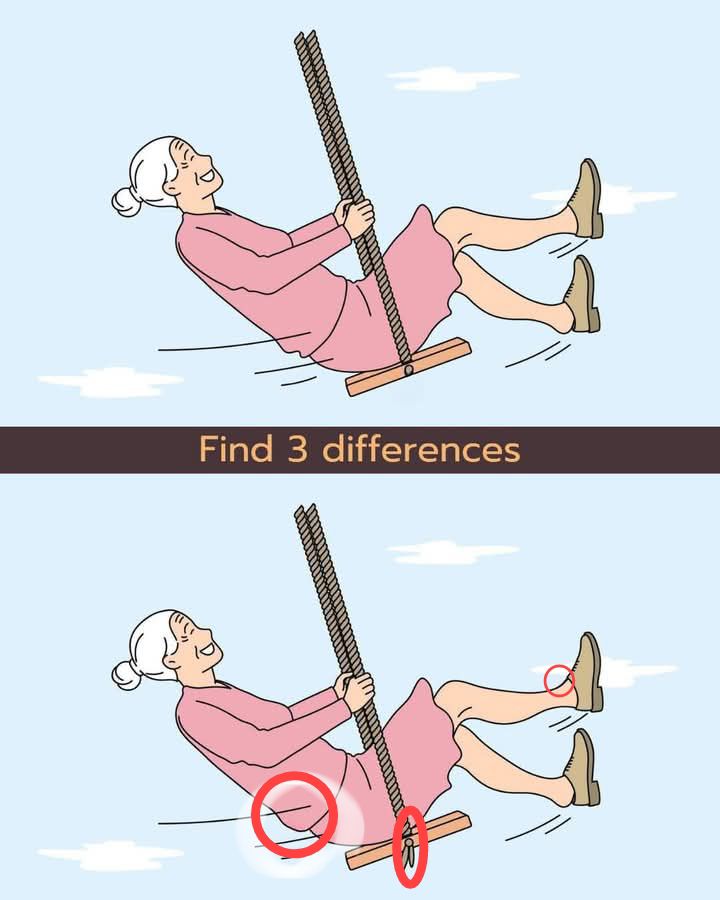
Conclusion: Swing Higher with Every Difference You Find
Our “Find 3 Differences” puzzle—centered on an elderly woman joyfully swinging among soft clouds—invites you to pause, observe, and celebrate the thrill of discovery. By honing your visual acuity, boosting your focus, and applying strategic puzzle-solving techniques, you’ll uncover every hidden tweak and enjoy that sweet moment of triumph. So the next time you see two near-identical images, grab your magnifier, split the scene into manageable sections, and let the fun begin. After all, life’s little puzzles remind us that joy often lies in the details—just like the simple pleasure of swinging high on a bright, breezy day.
